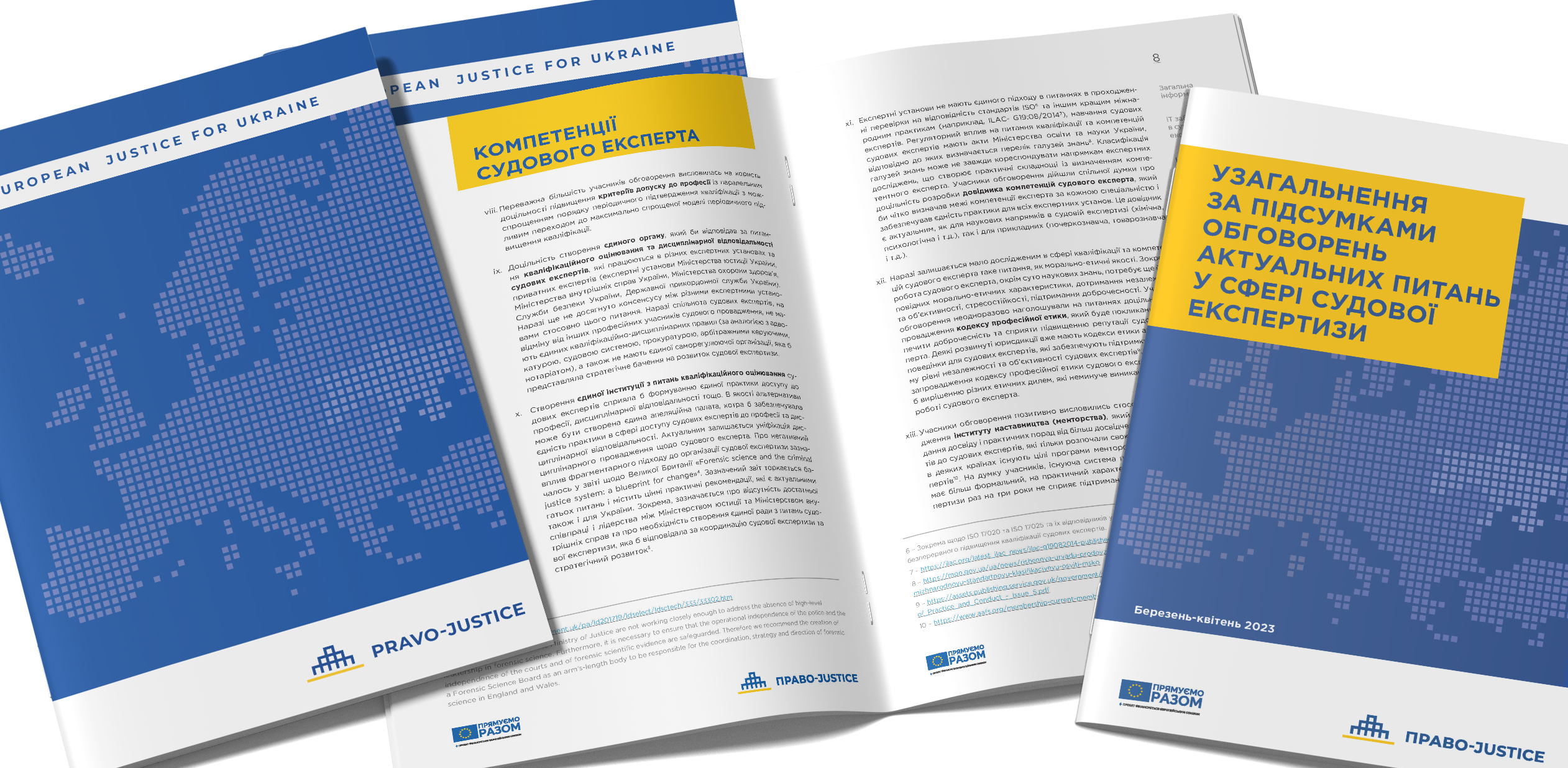Topical issues in the field of forensic expertise: 13 key recommendations based on discussions held by EU Project “Pravo-Justice”

In order to identify the key challenges in the field of forensic examination that need to be improved, EU Project “Pravo-Justice” held a number of public discussions and bilateral consultations in March-April. Representatives of the Parliament of Ukraine, the Ministry of Justice of Ukraine, state forensic institutions, private expert witnesses and international experts of EU Project “Pravo-Justice” were invited to participate in the discussions and consultations. Research on expert witness’ activities in other European countries was also conducted to find relevant practices and solutions that could be used in Ukraine.
The topics for the roundtables and discussions were selected in consultation with the Ministry of Justice of Ukraine, non-governmental organizations in the field of forensic expertise and based on the findings of a survey of expert witnesses.
Based on the outcome of the discussions, 13 key conclusions and recommendations were formulated that can be further discussed and taken into account in legislative and rulemaking activities:
-
ensure strategic self-governance and leadership in the field of forensic expertise, which will reflect all major stakeholders, to define the vision, strategy and agenda for forensic expertise at the national level.
-
It is advisable to strengthen cooperation and leadership among authorities that have their own forensic institutions, in particular, to develop a unified strategic vision for further development of the forensic sector.
-
It is advisable to establish a single qualification and disciplinary body that would contribute to ensuring unified approaches to determining eligibility, bringing to disciplinary responsibility, etc.
-
Forensic expertise should be considered from both a regulatory and market perspective. The activities of court expert witnesses should be profitable and sufficient to ensure transparent motivation. To this end, fair competition and a level playing field between large state-owned expert institutions and individual private expert witnesses must be ensured.
-
The court expert witnesses register should be modernized. It should not be just a list of court expert witnesses, but it should reflect more information required to select an expert (key information about his/her professional career, current workload, etc.).
-
It is advisable to pursue a policy of promoting best international practices and bringing Ukrainian forensic institutions closer to best international practices, implementing and making sure that they actually comply with ISO, UNODC, etc.
-
Consider introducing a model for randomly selecting an expert witness based on a number of criteria (specialization, workload, no conflict of interest, etc.) or clear and transparent rules according to which the head of the forensic institution distributes tasks among expert witnesses.
-
Consider introducing certain ethical rules for expert witnesses that would serve as a guideline for expert witnesses in ethically challenging situations (conflict of interest, pressure from management, boundaries of acceptable advertising, relations with clients and other expert witnesses, etc.).
-
Consider introducing mentoring so that more experienced expert witnesses can pass on their experience to less experienced ones.
-
Consider introducing a certain period for a person to take practical training course after passing the qualification exam before he or she can start full-time work as a court expert witness. Improve the current model of professional development (make the training more frequent, improve the content quality, make the training practical and focused on the expert witness’ individual needs, monitor the training of expert witnesses and analyse their daily needs).
-
Introduce regular training for judges, law enforcement officials and lawyers on issues related to appointing forensic expertise and interpreting expert witnesses’ opinions (including scientific principles and techniques in conducting forensic examinations and applying their opinions).
-
Take measures and facilitate testing of laboratories within state forensic institutions to ensure that they comply with ISO 17020, ISO 17025, etc.
-
Improve the technical capacities of forensic institutions, providing the forensic sector with modern equipment.
EU Project “Pravo-Justice” hopes that the above conclusions and recommendations will be taken into account by Ukrainian MPs when drafting a unified version of the law on reforming the forensic expertise sector based on draft laws No. 6284, No. 6284-1, No. 6284-2, No. 6284-3 already registered in the Parliament of Ukraine.
You can get acquainted with the Summary of the discussion of topical issues in the field of forensic expertise here.
EU Project “Pravo-Justice” will continue analysing the current lay of the land in forensic expertise through consultations and discussions in order to develop further recommendations on topics not yet included in this summary.